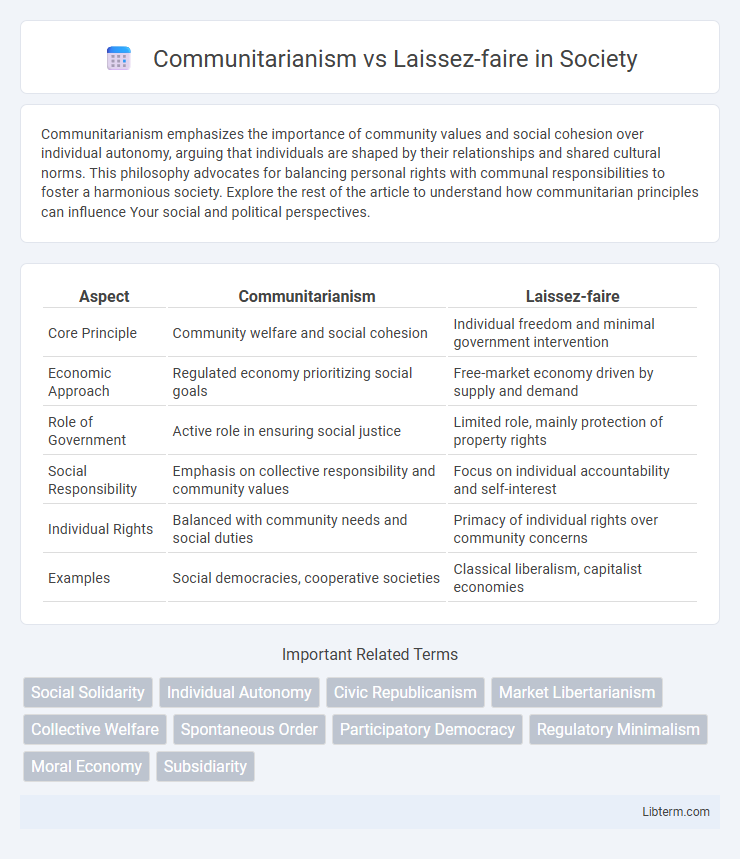Communitarianism emphasizes the importance of community values and social cohesion over individual autonomy, arguing that individuals are shaped by their relationships and shared cultural norms. This philosophy advocates for balancing personal rights with communal responsibilities to foster a harmonious society. Explore the rest of the article to understand how communitarian principles can influence Your social and political perspectives.
Table of Comparison
| Aspect | Communitarianism | Laissez-faire |
|---|---|---|
| Core Principle | Community welfare and social cohesion | Individual freedom and minimal government intervention |
| Economic Approach | Regulated economy prioritizing social goals | Free-market economy driven by supply and demand |
| Role of Government | Active role in ensuring social justice | Limited role, mainly protection of property rights |
| Social Responsibility | Emphasis on collective responsibility and community values | Focus on individual accountability and self-interest |
| Individual Rights | Balanced with community needs and social duties | Primacy of individual rights over community concerns |
| Examples | Social democracies, cooperative societies | Classical liberalism, capitalist economies |
Introduction to Communitarianism and Laissez-faire
Communitarianism emphasizes the importance of community values, social responsibilities, and collective well-being over individual autonomy, advocating for policies that strengthen social bonds and promote common good. Laissez-faire champions minimal government intervention in the economy, prioritizing individual freedom, free markets, and the natural regulation of supply and demand to drive economic growth. These contrasting ideologies reflect differing views on the balance between societal obligations and personal liberty in shaping political and economic structures.
Core Principles of Communitarianism
Communitarianism emphasizes the importance of social cohesion, collective responsibility, and the common good, advocating that individual rights must be balanced with community duties to promote societal well-being. Core principles include fostering strong social institutions, encouraging civic participation, and prioritizing moral values that support mutual interdependence within communities. Unlike laissez-faire, which stresses minimal government intervention and individual freedom in economic and social affairs, communitarianism calls for active state involvement to ensure equitable distribution of resources and maintain social harmony.
Foundational Tenets of Laissez-faire
Laissez-faire economics emphasizes minimal government intervention in markets, advocating for free enterprise and individual economic freedom as fundamental principles. It asserts that market forces of supply and demand self-regulate, leading to efficient allocation of resources and innovation without external control. This philosophy champions private property rights, voluntary exchange, and limited regulation to foster competition and economic growth.
Historical Origins and Evolution
Communitarianism emerged in the mid-20th century as a response to the perceived excesses of individualism, drawing intellectual roots from philosophers like Charles Taylor and Michael Sandel who emphasized the role of community and shared values in shaping identity and moral responsibility. Laissez-faire economics traces back to the 18th century with Adam Smith championing minimal government intervention in markets to promote economic freedom and efficiency during the Industrial Revolution. Over time, communitarianism evolved to critique unchecked capitalism and advocate for social cohesion, while laissez-faire principles influenced modern neoliberal policies prioritizing deregulation and free enterprise.
Economic Implications and Practices
Communitarianism emphasizes collective responsibility and social welfare, advocating for economic policies that prioritize equitable wealth distribution, strong community networks, and public goods provision. Laissez-faire economic practices champion minimal government intervention, promoting free markets, individual entrepreneurship, and competition as drivers of innovation and efficiency. The economic implications of communitarianism often involve higher taxes and regulatory frameworks to support social programs, while laissez-faire policies tend to favor deregulation, lower taxes, and market-driven outcomes.
Social Impact and Community Values
Communitarianism emphasizes the importance of social responsibilities and collective well-being, fostering strong community bonds and prioritizing public goods over individual gain. In contrast, laissez-faire advocates for minimal government intervention, promoting individual freedom and market-driven solutions that may lead to social disparities and reduced communal support. The social impact of communitarianism often results in enhanced social cohesion and equitable resource distribution, whereas laissez-faire can create innovation and economic growth but sometimes at the expense of social safety nets and community values.
Individual Rights vs Collective Responsibility
Communitarianism emphasizes collective responsibility, advocating that individual rights must align with the community's well-being and social cohesion. Laissez-faire prioritizes individual rights, supporting minimal governmental interference to maximize personal freedom and economic autonomy. The tension between these ideologies centers on balancing personal liberty with social obligations, shaping policies on welfare, regulation, and civic duties.
Policy Applications and Case Studies
Communitarianism emphasizes policies that promote social welfare, community engagement, and collective responsibility, often manifesting in robust public services and regulatory frameworks that prioritize social equity, as seen in Scandinavian countries' extensive welfare states. Laissez-faire advocates for minimal government intervention, championing free markets and individual autonomy, with the United States' deregulation trends in the late 20th century illustrating the impact of laissez-faire principles on economic growth and innovation. Case studies comparing these approaches highlight differences in income inequality, public health outcomes, and social cohesion, providing evidence for the trade-offs between market freedom and community-focused policy frameworks.
Criticisms and Contemporary Debates
Communitarianism faces criticism for potentially limiting individual freedoms through its emphasis on community values and social responsibilities, which some argue can lead to conformity and suppression of dissent. Laissez-faire capitalism is often criticized for exacerbating economic inequalities and neglecting social welfare due to minimal government intervention. Contemporary debates focus on balancing the protection of individual rights with promoting social justice, highlighting the tension between market freedom and community accountability.
Future Prospects and Synthesis
Communitarianism emphasizes the future prospects of fostering social cohesion and collective responsibility to address societal challenges such as inequality and environmental sustainability, contrasting with laissez-faire's focus on individual freedom and market-driven innovation as engines of economic growth. A synthesis of these ideologies could integrate communitarian values of community welfare with laissez-faire principles of limited government intervention, potentially creating a balanced framework that supports both social equity and economic dynamism. Emerging trends in public policy suggest hybrid models combining regulatory oversight and market incentives are gaining traction to optimize social outcomes while preserving personal liberties.
Communitarianism Infographic

 libterm.com
libterm.com